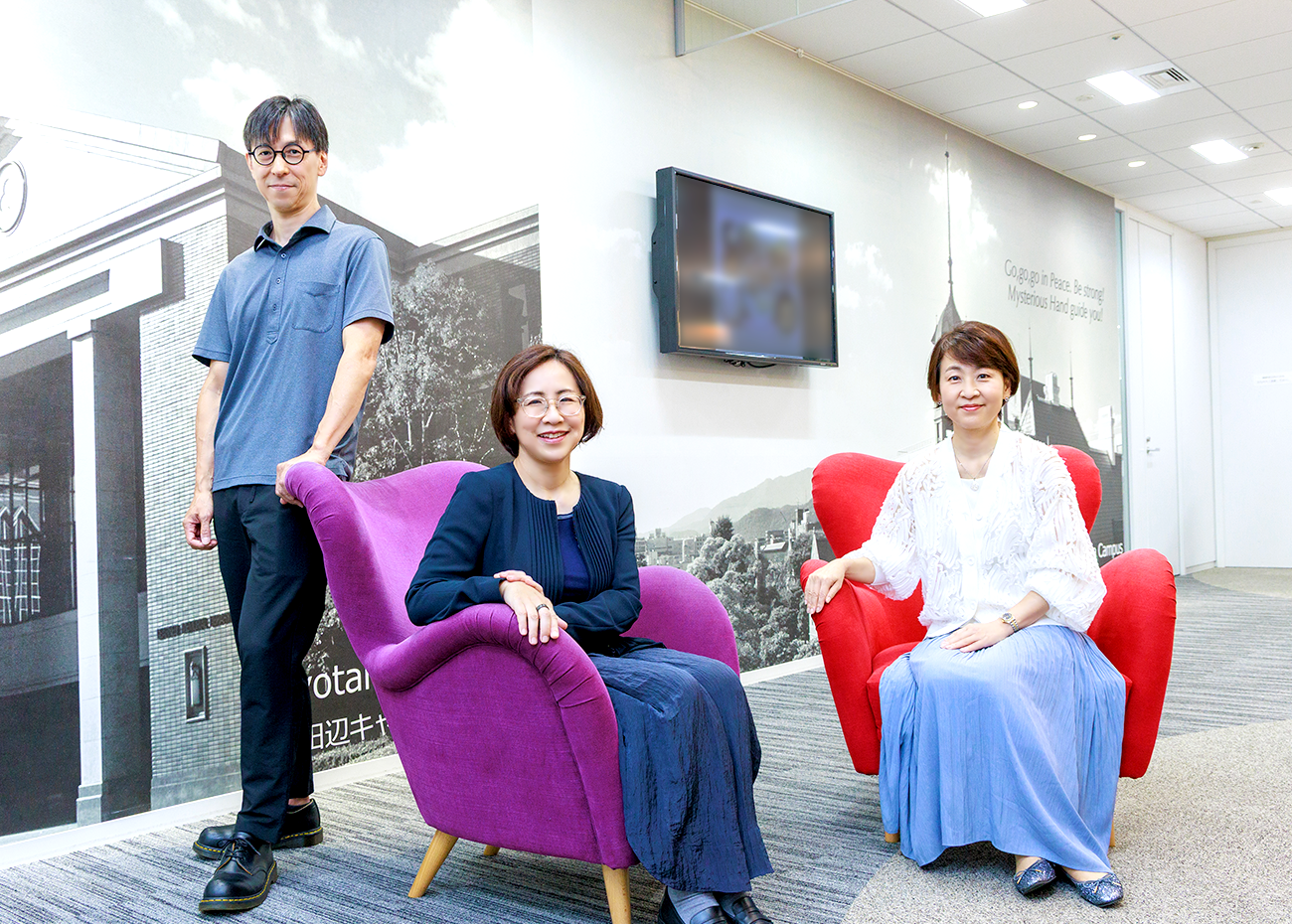

Photo: Rekishu Yamazaki, Natsumi Ikoma, Yukiko Motomura
#ArtsScience #ScienceCommunication #ScienceLiteracy #ScienceandSociety
The dialogue took place on July, 2025.
Science journalist and Doshisha University Special Visiting Professor Yukiko Motomura, Associate Professor Rekishu Yamazaki, who engages in cutting-edge research in quantum physics, and CLA Dean, Professor Natsumi Ikoma, in charge of the ICU curriculum, explore contemporary societal and scientific issues, as well as the relationship between science and liberal arts.
How should we engage with science
in an era of rapidly evolving science and technology?
Addressing the pressing challenges confronting humanity necessitates continued advancement in science and technology, and no one can claim to be unconnected to such endeavors. As Ikoma says, "scientific thinking is indispensable for addressing challenges such as environmental degradation, poverty, and inequality."
The development of science and technology continues to accelerate, with the evolution of AI serving as a clear and compelling example. Motomura points out that this will continue since "science will progress as long as humans possess intellectual curiosity." However, society as a whole struggles to keep pace with this rapid advancement. Yamazaki cautions, "Neglecting to discuss the background of scientific progress and its possible risks can lead to significant consequences."
While science is indispensable, its continued advancement entails inherent challenges. What then is the best way to approach science and technology? The discussion highlighted the importance of enhancing scientific literacy, cultivating a deeper understanding of scientific knowledge, skills, and ways of thinking, along with the ability to effectively navigate issues spanning everyday life to broader societal challenges, and the importance of liberal arts in realizing this goal.
Paragraph 01
Why Do We Need Science Communicators Today?
――The general public struggles to keep pace with the rapid progress and increasing complexity of science and technology. In Japan, this is especially true, as the education system typically separates the arts and sciences into distinct tracks. This is where science communicators play a vital role. The tradition at ICU since its foundation has been to offer a liberal arts education incorporating the humanities, social sciences, and natural sciences, an ideal environment for nurturing science communicators. This dialogue began by confirming their role and importance.
Motomura: In 2016, Doshisha University launched the Science Communicator Training Minor Course to cultivate individuals capable of bridging scientific concepts and society. Undergraduates in the Faculty of Life and Medical Sciences, School of Theology, Faculty of Letters, Faculty of Social Sciences, Faculty of Law and Faculty of Economics can take this course. While most universities offer this course at the graduate level, we wanted to offer students with flexible sensibilities the opportunity to learn to think critically and acquire essential skills, while engaging with a broad range of subjects.
Ikoma: At ICU, we believe in the importance of scientific thinking, so we offer interdisciplinary general education courses designed to cultivate this mode of thought. Contemporary society is divided into specialized fields, making it difficult for those with an arts background to grasp scientific lingo, and vice versa. This divide poses a challenge to addressing complex societal issues such as environmental degradation, poverty, and inequality. Solving complex problems requires experts from varied disciplines to connect and collaborate, integrating insights from both the arts and the sciences.
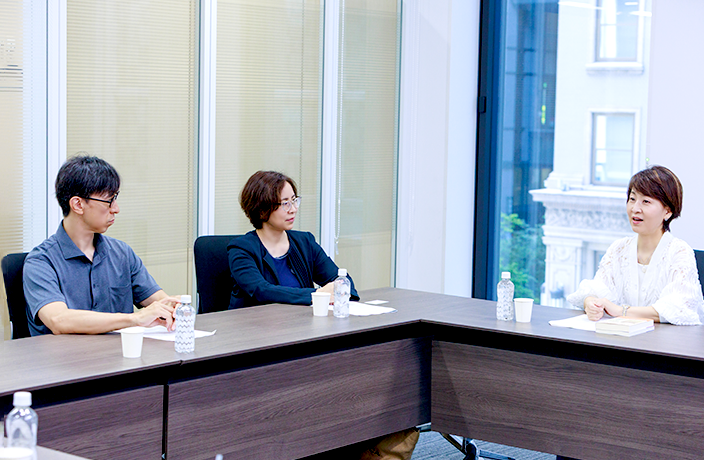
Motomura: Around 2005, the Japanese government initiated efforts to cultivate science communicators. Initially, they were perceived as having limited roles, such as museum guides or science reporters tasked with explaining scientific concepts in plain language. Society has grown significantly more complex since then, and their role has expanded to include those who serve as mediators between corporate researchers and consumers in the development of improved products. School teachers are also science communicators, while we need government officials to assume this role as liaisons between everyday life and policy, particularly when introducing genetically modified foods or measures against infectious diseases.
Yamazaki: The first thing we must do when communicating science is to align our language. Out of consideration for non-science students, we define the concepts we want to convey and the terms we use, so that students can become familiar with science communication. In this context, bilingual instruction in English and Japanese at ICU offers a distinct advantage. Establishing common ground is essential for fostering dialogue among students from diverse linguistic and cultural backgrounds. At ICU, students regularly engage in coursework with peers from different disciplines, fostering skills needed for mutual understanding and enhancing communication abilities.
Ikoma: That's right. At ICU, given the wide range of backgrounds students come from, the environment naturally challenges them to reconsider their own values rather than assume them to be universal when engaging in dialogue with others. Even when students hold strong beliefs, they refrain from presenting them as absolute. Instead, they say, "Here's why I think this—what's your perspective?" This enables both parties to understand their differences, and that in itself is a meaningful learning experience. We don't offer a formal course in science communication at ICU, but we effectively cultivate the skills the role demands. The exchange is reciprocal: arts students, for instance, can support scientists in understanding philosophical frameworks and perspectives.
Motomura: That is central to the role of science communication. Science can sometimes feel inaccessible, so it's crucial to communicate from the listener's perspective to share information effectively.
Paragraph 02
Science Matters, Yet Broader Considerations Remain Crucial
Has our society matured to the extent that we can cope with the accelerated development in science and technology? If not, what do we lack?
Yamazaki: In modern society, we often witness excessive hype around cutting-edge technologies such as quantum computing, my area of expertise, much like the fervor once seen around STAP cells and iPS cells. This enthusiasm can lead to tunnel vision, causing us to overlook inherent risks, what was involved in the course of development, and whether continued advancement is truly warranted. For instance, the current push for scientific solutions to global challenges like climate change aims to build a sustainable world. Yet, I fear blind faith in science may drive excessive resource consumption under the assumption that all technological progress is inherently good and should always move forward.
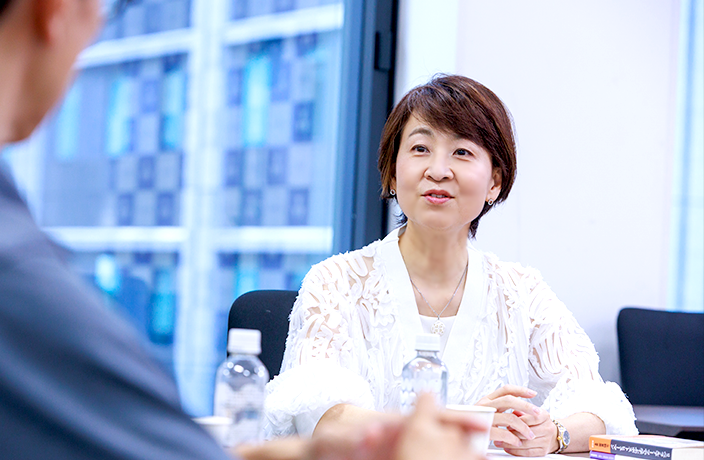
Motomura: I agree. As long as human curiosity meets the mysteries of nature, the advancement of science is inevitable. Yet, we must also cultivate the wisdom to pause and reflect. The problems we face, like global warming, climate change and AI, cannot be solved by scientists alone. In the 21st century, tackling these trans-science*1 issues requires scientists and experts from various disciplines to unite and work across boundaries. It's time we leave behind the 20th-century model of science education, which focused solely on the transmission of knowledge.
Ikoma: The 20th-century model assumed that science was inherently just and unquestionably right. In the 21st century, we have come to recognize that scientific perspectives can be flawed-and can lead to human error. Following dramatic advances of science in the 18th century, the early 19th century saw a growing wave of skepticism, reflected in cultural works like Frankenstein. This trend is resurfacing, as we are urged to reexamine our views on AI, environmental crises, and global warming. By pausing to navigate these challenges, the reflective insights of the liberal arts, derived through literature, philosophy, and religious studies, are becoming increasingly vital.
*1..Trans-science: Coined by American physicist Alvin Weinberg in 1972, the concept aimed to address issues, such as the use of nuclear power and environmental challenges, that cannot be resolved by scientific methods alone, by integrating social and ethical values with political approaches.
Paragraph 03
The Role of Education and Issues in the Status Quo
――Liberal arts is indispensable for literacy in science, its essence being interdisciplinary study across the arts and sciences. But there may be a difference in how this approach is implemented in the U.S. and Japan. What initiatives do Japanese universities offer to foster collaboration between students in the arts and sciences?
Yamazaki: In the U.S., students don't see themselves as fundamentally arts- or science-oriented. Devoid of an embedded culture of division between the arts and sciences, students often study subjects like psychology and biology side by side, or they explore combinations such as physics and philosophy. In contrast, students in Japan are often subtly aware of the divide between the arts and sciences. As a result, many students come to believe they are simply not suited for subjects like mathematics and physics, while others feel that art and music aren't meant for them. At a liberal arts college in the U.S., I studied religion, psychology, history, and physics-while music theory and pottery captivated me for a time. I was fortunate to shape my thinking by connecting insights from courses I chose based on my interests at the time, a freedom that perhaps marks a key distinction between the educational approaches in the U.S. and Japan.
Motomura: Doshisha's science departments are based at the Kyotanabe Campus in southern Kyoto Prefecture, while arts departments are located at the Imadegawa Campus in the heart of Kyoto City. While this separation makes interaction between arts and science students challenging, they come together in the Science Communicator Training Minor Course. In the practicum-based courses, they often find themselves speaking entirely different languages. Arts students struggle to follow scientific terminology, while science students are often surprised by the unexpected insights their arts peers contribute. This divide stems from the cultural separation of disciplines in high school. Yet in college, students gradually begin to understand one another. Through shared coursework, they naturally learn to appreciate diverse perspectives, sharpen their thinking, and communicate ideas in ways that resonate across disciplines.
Yamazaki: At ICU, in the general education Post Human course*2, faculty from international relations, psychology, and the natural sciences engage in cross-disciplinary dialogue with students. These interactions highlight the richness and excitement of connecting across academic disciplines.
Motomura: That sounds fascinating. It makes me want to take the course myself. I see humans as lifelong learners. Scholars may devote themselves to mastering a specific field, but they are citizens first-and part of the natural world. Outside their area of expertise, they remain amateurs. That doesn't exempt them from engaging with other disciplines. It's essential to show students that learning is a continuous journey, not confined to specialization but enriched by curiosity across all domains.
――Japanese universities often operate in silos, with departments functioning independently. What are the advantages of studying at ICU, where arts and science students intermingle within the liberal arts program?
Motomura: Observing students today, I worry that they are overly conscious of the divide between the arts and sciences, a mindset shaped by being categorized into one or the other during the preparation for college entrance exams. Since they were only required to study subjects relevant to their chosen track, many may assume there's no need to engage with disciplines outside their specialization, leaving little room to explore broader interests. Once they enter university, their next goal often becomes securing a good job. As a result, they focus on what directly supports their job-hunting efforts, while other areas are given lower priority. I tell my students, "I understand how important job-hunting is to you. But you have a long life ahead of you; indeed, many of you will live to see the end of the 21st century. So plan your studies now in a way that will allow you to feel fulfilled when you reach that fin de siècle."
Ikoma: At ICU, some students arrive with a clear sense of what they want to study, while others enroll precisely because they're still exploring, thanks to our flexible system that allows them to choose their major later than at most institutions. With both types of students sharing the same classroom, it's fascinating to see those who seemed firmly set on a particular path uncover unexpected interests along the way.
Yamazaki: In our general education Post Human course that I mentioned earlier, students from diverse majors, ranging from freshmen to seniors, share the same classroom. Younger students are inspired by upperclassmen who venture into unfamiliar territory and enroll in courses they never imagined taking. This is part of the culture at ICU.
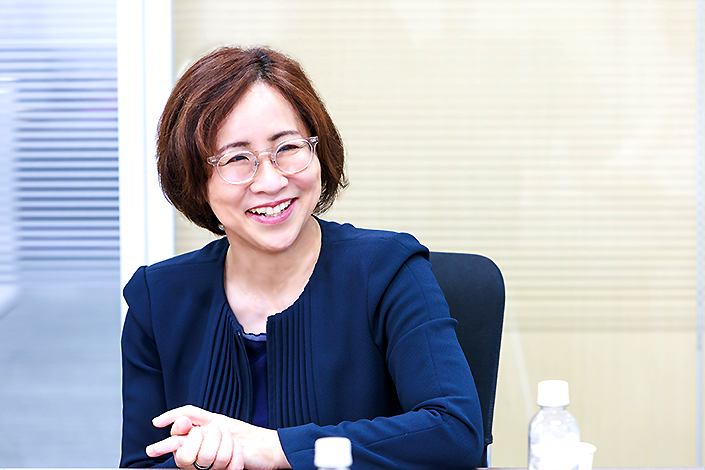
Ikoma: Our single College of Liberal Arts at the undergraduate level is a distinct advantage. Rather than being confined to separate academic tracks, students form a single, cohesive group, free to explore diverse fields without being pigeonholed. Our general education courses stand apart from those at other universities, as students are free to take them even in their senior year. This creates a dynamic classroom environment where younger and older students engage in shared discussions. By explaining concepts, upperclassmen reinforce their own learning while inspiring those who follow in their footsteps.
――At ICU, where the essence of liberal arts is fully practiced across the university as a whole, what are the issues?
Motomura: Only a limited number of families can afford to send their children to ICU, given the financial burden among other factors. These parents are often highly conscientious, their children typically arriving with a wealth of experiences already gained through high school. In this sense, ICU can be seen as a selective liberal arts institution. In this advantageous environment, it's important for students to recognize the unique opportunity they have to engage freely in dialogue with classmates who hold diverse opinions and to study across a range of disciplines. Entering society with lofty ideals, one may feel disheartened when well-founded opinions are dismissed or when political and global developments seem to move in unexpected directions, especially for those striving for peace as engaged citizens. Even in such moments, I hope they will not lose heart or fall into despair, but remain steadfast in their commitment to pursue good, drawing strength from the skills and values they cultivated in college.
Ikoma: The Service Learning*3 courses at ICU help students develop the skills to navigate and engage with diversity. Students earn academic credit by applying the knowledge they gain in our exceptionally supportive environment to real-world experiences that contribute to society. Many faculty members are actively involved, with programs offered both in Japan and abroad, such as initiatives to build schools in developing countries. Through their experiences at project sites in developing countries, students often find their values challenged and transformed. They also come to realize that progress cannot be achieved through sound arguments alone.
*2..General education Post Human course: Brochures (Japanese ver.)
*3..Service Learning: Learning based on volunteer activities to nurture the ability to contribute to society. By collaborating with others toward a shared goal of addressing societal challenges-and actively participating as if they were stakeholders, students learn to apply their knowledge to real-world problems. This experiential program encourages students to reflect critically on their thoughts and behavior by fostering new perspectives.
Paragraph 04
Empowering the Future with Liberal Arts Education
――How do we nurture students in higher education when they arrive from secondary schools with a deeply-ingrained vison of a divide between the arts and sciences? Liberal arts education empowers individuals to recognize societal issues as their own and learn through meaningful engagement with the world around them. Given the increasing demand for interdisciplinary competence in a time of uncertainty, what measures do liberal arts colleges take to ensure that arts students gain meaningful exposure to science education?
Ikoma: We regard mathematical and scientific literacy, such as the ability to read statistics, as essential in navigating the complexities of modern life. In addition to the introduction of a MEXT-approved LAMDA (Mathematics, Data Science and AI Education in Liberal Arts) program, we offer ICU-style courses that go beyond simply delivering knowledge. For example, a course co-taught by faculty specializing in information science or mathematics and social science focuses on interpreting statistics in real-world contexts. It emphasizes the importance of applying foundational maths and science skills to practical, societal issues.
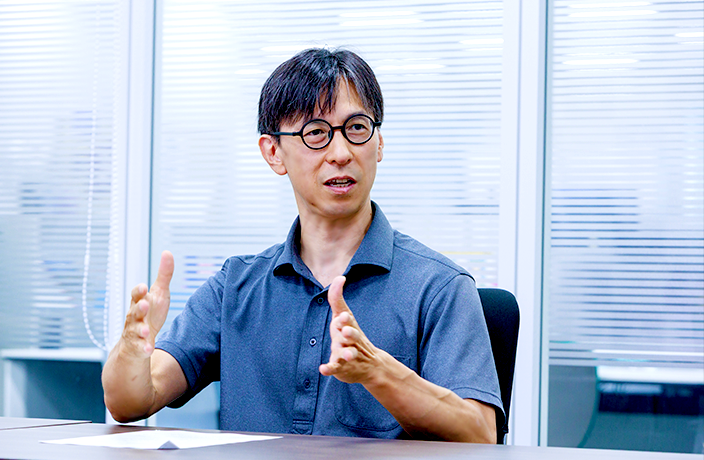
Yamazaki: Our students come from diverse educational backgrounds, with varying levels of exposure to the sciences. To support those who may be less prepared, we offer accessible introductory courses designed to build confidence and foundational understanding. Non-science majors also take these courses. Our goal is to make these courses approachable, empowering students to build valuable skills with ease.
Ikoma: As Dean, I encourage faculty in the natural sciences to design courses that engage non-science majors. Our offerings are crafted to captivate students who may have developed an aversion to science during high school. To support students from arts-focused educational backgrounds, we have Q Support (Quantitative Skills Support), a peer assistance system in which undergraduates provide help to those facing difficulties in science courses.
――How does the instruction for natural science majors unfold in a liberal arts college like ICU?
Yamazaki: In the natural science major at ICU, students can choose to study engineering after building a foundation in pure science. Those who develop a background in the natural sciences, then choose to explore technology, often continue their studies in graduate schools, either at ICU or at other institutions in Japan and abroad. My undergraduate quantum theory students have pursued research in aerospace engineering in the U.K. or at the Atmosphere and Ocean Research Institute at the University of Tokyo, building on their grounding in physics.
Motomura: Your students have nurtured careers in diverse domains. Building a strong foundation in the fundamentals of science and then advancing to deeper studies, armed with a broad perspective, is an essential model for learning. As science continues to shape society in increasingly profound ways, the competence and awareness of scientific leaders will become ever more critical. In simple terms, honoring nature with humility is vital; we need to be aware of the fact that we are always acting under the grace of something far greater than ourselves. Relying on a sense of omnipotence derived from success in a narrow field can lead to failure, especially when achievement is measured solely in comparison to others.
Yamazaki: The adverse effects of science have grown as technologies have become increasingly globalized and widely disseminated. Scientific knowledge alone is insufficient to address the complex problems that arise when science is applied by humans in society. Without the lens of the humanities and social sciences, we may not even recognize what the real issues are. This underscores why institutions like the Massachusetts Institute of Technology (MIT) integrate the humanities and social sciences into their curriculum. ICU's approach is very similar. Studying science alone will no longer be enough: we must also nurture broader viewpoints to fully grasp its impact on society.
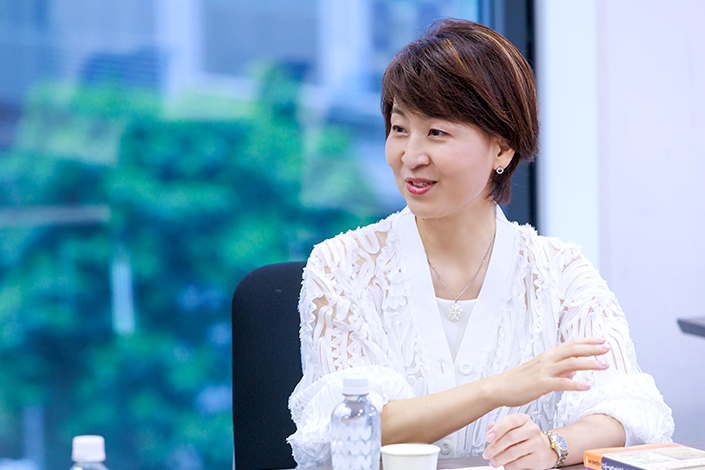
Motomura: This is the very essence of so-called trans-science. When this concept was coined in the 1970s, countries around the world were experiencing surprisingly similar situations. While the U.S. and the Soviet Union poured vast resources into the race for nuclear power and space exploration, the Club of Rome*4 published The Limits to Growth. While the civil rights movement gained momentum in the U.S., public skepticism toward scientific and technological progress grew in Japan, where environmental pollution had become a pressing concern. I believe this is vividly reflected in the "Survey on the National Character of the Japanese People," conducted every five years by the Institute of Statistical Mathematics (ISM)*5. Within this survey, there is a question asking about the relationship between nature and humans. In 1968, the highest number of respondents chose "make use of nature," followed by "conquer nature," with the least choosing "follow nature." In 1973, "follow nature" ranked above "conquer nature." The most recent data, some 50 years later, show "follow nature" at the top, with less than 10% choosing "conquer nature."
Ikoma: During the latter half of the 1960s, the Vietnam War exposed the devastating consequences of human greed. It was a sobering moment when we realized that defoliants, products of scientific advancement, had the potential to threaten the very survival of our species.
*4..The Club of Rome: A global think tank based in Switzerland.
*5.. Institute of Statistical Mathematics (ISM): Attitudes Toward Life and the Environment 2.5 Man and Nature
Here are three opinions about man and nature. Which one of these do you think is closest to the truth?
1. In order to be happy, man must follow nature (follow nature)
2. In order to be happy, man must make use of nature (make use of nature)
3. In order to be happy, man must conquer nature (conquer nature)
Paragraph 05
Approaching Science in the Service of Society
――Discussions around the educational bridge between secondary and higher education have gained momentum, especially after MEXT emphasized the importance of collaborative projects between high schools and universities. Although current screening methods often draw criticism, solutions may emerge through a deeper exploration of the essence of education. What challenges exist in helping high school students integrate science meaningfully into their lives?
Motomura: While objectivity is a cornerstone of scientific inquiry, science education doesn't have to begin there; it can start with subjectivity. For example, Professor Toshitaka Hidaka describes how his fascination with nature began in childhood in his essay Why Do Butterflies Fly? As a boy, he observed a small white butterfly, a familiar visitor to his garden, and traced its movements with quiet curiosity, wondering where it came from and where it would go. Through this simple act of observation, he came to understand the butterfly's ecology—not through dry facts one might expect from Chat GPT, but through a deeply personal inquiry rooted in subjective experience. Are such engaging and exploratory science classes happening across Japan? This may help explain why so many students are losing interest in the subject.
Yamazaki: Science education in Japan tends to progress at a much faster pace than in the U.S., continuing this intensity through high school and into university. In the U.S., students often enter graduate school without having studied advanced physics beforehand, as many begin exploring the subject during college. This approach allows genuine interest to develop and helps prevent the academic fatigue that can result from being forced to study a subject. In Japan, we might consider adopting a more flexible approach: the curriculum often feels overloaded, leaving little room for genuine engagement.
Motomura: The Curriculum Guidelines seem designed to promote broad but shallow learning, primarily to prepare students for college entrance exams. Underlying this approach is a presumptuous notion: "To cultivate individuals capable of leading Japan as a scientific nation, they must master specific content by a certain age." As not all students will follow the same path, this rigid framework risks prioritizing uniformity over genuine curiosit
Yamazaki: This kind of cramming fails to cultivate the essential skills and mindset needed to become a capable researcher. As a postdoctoral fellow, I worked at national universities such as Osaka University, Kyoto University and the University of Tokyo. The top 10 to 20% of students were engaging in exceptionally advanced research at each. The similarity of these figures indicates that the aptitude assessed in entrance exams may bear little relation to a student's true potential for research. What stood out in those who became exceptional researchers was their keen ability to notice subtle details. They weren't merely hard workers or academic grinds; they were intuitive thinkers who made discoveries while in a relaxed, reflective state of mind. High school students often ask me what they should do after being accepted to university through early-decision recommendations. They've been working so hard, and so I tell them to have fun in the woods, where they can observe fallen branches in unexpected places, leaves and bugs. This is a source of insight. I often wonder why this kind of instruction is so rare in science education. By skipping experiential learning and focusing solely on facts, we deny students the opportunity to cultivate the vital skill of observation.
Ikoma: I'm well aware of the negative impact of the preparation for entrance exams in Japan. Cramming vast amounts of information leaves little room for free thinking and exploration. General admissions at ICU*6 is unique: it invites students to think independently and creatively. Yet many shy away from it, saying they don't know how to prepare. When I tell them preparation isn't necessary in the conventional sense, they react with trepidation. This reveals how detrimental the culture of cramming is to the current education system.
*6..General admissions at ICU: The entrance examination is not the typical sort of general admissions test. It consists of three main parts: an interdisciplinary test, with a choice between humanities/social sciences or mathematics and science/natural sciences; the Aptitude for Liberal Arts (ATLAS), for which students listen to a short lecture and answer questions about its content; and an English language test. The exam assesses students' readiness for liberal arts education.
――To conclude the discussion, the three explored how universities can nurture young people who will shape the future of the world.
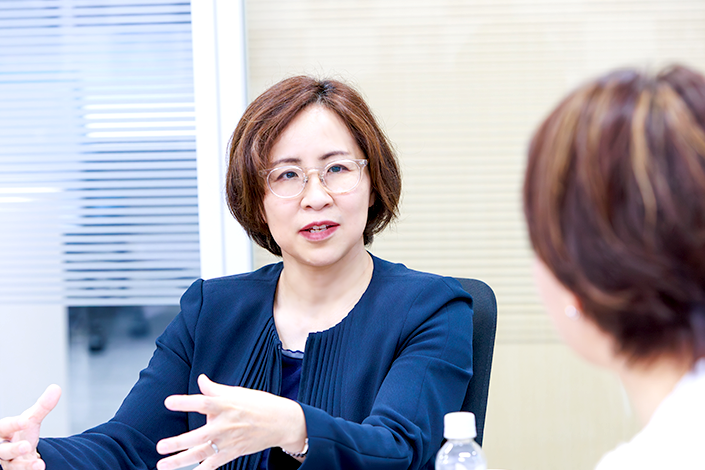
Ikoma: From the point of view of the educational system in Japan today, college should be a place for students to broaden their interests and unlock their full potential by nurturing curiosity beyond the rigid divide between the arts and sciences enforced in the current education system. If they are not given the opportunity to transcend this division before entering society, they risk being confined to a narrow specialization. Integrating diverse knowledge before entering society is essential. From this perspective, the value of a liberal arts education at universities will continue to rise.
Motomura: I always tell my students, "The world is full of complexities beyond what you can imagine; but never forget, each of you has the power to make a meaningful impact." My mission during their four years in college is to help them cultivate the essential life skills they will need to thrive beyond graduation. In my science communication course, I emphasize how science can become a powerful ally. By learning to interpret scientific perspectives and understand numerical data, students gain the tools to make informed decisions to safeguard themselves and those they care about.
Another issue with the current status quo is that science remains a quiet topic in Japan. While people readily voice opinions on social welfare, public projects, and politics and money, discussions around science are noticeably absent. I want students to recognize that science is deeply intertwined with many aspects of modern society. As future leaders and contributors, students must be equipped to engage thoughtfully with scientific issues, especially given that public funds, including taxes, are invested in scientific research. Science communication is a vital skill-and a foundational pillar for a healthy democracy. Fortunately, today's students are deeply engaged with pressing global issues such as sustainability and diversity. They are far more perceptive and thoughtful than many adults give them credit for, and they care deeply about whether humanity can enter the 22nd century with hope and happiness. When students connect their university learning to real-world
challenges, they
become empowered to take the initiative and drive meaningful change. I remain optimistic that they will rise to this task.
Yamazaki: I believe there is great value in faculty and young students collaborating in education and research. While faculty bring experience and expertise, their radar may not be as finely tuned to change. Younger students observe society closely and think deeply about emerging social and environmental shifts. Their insights can be remarkably sharp. It's essential that we listen to, and learn from, them, embracing their perspectives to enrich our collective understanding and to drive meaningful progress. I believe the true purpose of education is to help students recognize and embrace what they genuinely find meaningful. Rather than simply teaching, we should collaborate with them, by offering methodologies that nurture their ability to observe and interpret the world through their own thoughtful perspectives.
Ikoma: Our goal at ICU is to nurture students who will strive to change the world-not for personal gain or economic success alone, but for the well-being of society and the planet as a whole. In this pursuit, science offers an indispensable lens: we aim to convey the value of science thoughtfully and skillfully.
【Postscript】
Science Literacy as a Foundation for Civic Engagement
Scientific literacy is essential, but it cannot be cultivated overnight. Institutions of higher learning play a critical role in shaping how quickly science literacy takes root in society.
Motomura expressed concern for the lack of depth in scientific thinking among university students. "I'm often struck by how many respond simply with the word 'technology' when asked to define science and technology. They tend to equate technology, derived from scientific knowledge, with the entire concept. Yet, in reality, science and technology are distinct, as reflected in the English phrase 'science and technology.'
Science is a pursuit fueled by intellectual curiosity, a quest to understand nature, free from valuejudgments that dismiss ideas as wasteful simply because they lack immediate practical use. Yet students are often not taught this, making it challenging for them to adopt scientific perspectives and ways of thinking."
Transforming students' mindsets and cultivating scientific literacy in college requires more than a siloed undergraduate education. This is precisely where the liberal arts come into play. Ikoma says of the endeavor at ICU since its foundation: "Students take general education and other courses aligned with their interests, whether in the arts or sciences, and select a major at the end of their sophomore year. Even after they make this decision, they are free to take courses outside their major. They choose a personally meaningful theme to investigate through an interdisciplinary lens for their senior thesis. We offer a bilingual education in English and Japanese, where students educated in an English background are required to take courses instructed in Japanese, and those whose first language is Japanese are required to take courses in English. This environment brings together students from diverse academic, linguistic, cultural and social backgrounds into the same classroom each day. While tensions may occasionally arise, it also creates opportunities for dialogue, mutual understanding, and collaborative learning. This is how we nurture global citizens at ICU."
In addition to fostering interdisciplinary learning across the humanities, social sciences, and natural sciences, ICU provides an environment for reflection and discovery among students from diverse backgrounds, contributing to the cultivation of scientifically literate and socially conscious citizens.
Sub Dialogue
Episodes from Her Days as a Journalist: Experiencing the Heart of Science
- Motomura:
- When I interviewed ICU Professor Emerita Haruko Kazama for a column I started in the White Paper on Science and Technology as a reporter at the Mainichi Shinbun Science and Environment Department, she shared a standpoint that has stayed with me: "While people often focus on the branches of science, it's the trunk and roots that truly matter. Liberal arts denotes the effort to cultivate the soil where science can take root and thrive." I remain profoundly grateful to the professor and ICU for shaping my perspective in the formative stages of my journey as a science and environmental reporter.
- Ikoma:
- What was the scientific topic that interested you most as a reporter?
- Motomura:
- Elementary particles. Professor Masatoshi Koshiba, who received the Nobel Prize in Physics in 2002 for his groundbreaking research on neutrinos captured from space, was a visionary leader. Driven by his passion for discovery, he inspired others to collaborate and successfully built a massive experimental apparatus. His ability to realize an unprecedented idea led to the creation of this extraordinary observation machine. It was thrilling to witness his bold scientific pursuit of the unknown. The experience revealed to me the very essence of science.
- Yamazaki:
- Neutrinos are pure physics, unbound by practical application, yet filled with a certain romance. Scientists pursue research much like climbers tackle mountains: simply because they are there. Even without direct societal use, the drive to explore remains at the heart of scientific pursuit.
- Motomura:
- Even without practical use, the pursuit of these mysteries opens doors to new dimensions in astrophysics, offering keys to countless enigmas in space. I witnessed an endless chain of questions; each one solved reveals another, continuing the journey of discovery.
- Ikoma:
- This is the most captivating aspect of science. Yet under the current education system, it's rarely conveyed to students, leading many high schoolers to develop an aversion to science, which is truly unfortunate. I want students at ICU to experience the excitement and wonder that science has to offer.
PROFILE
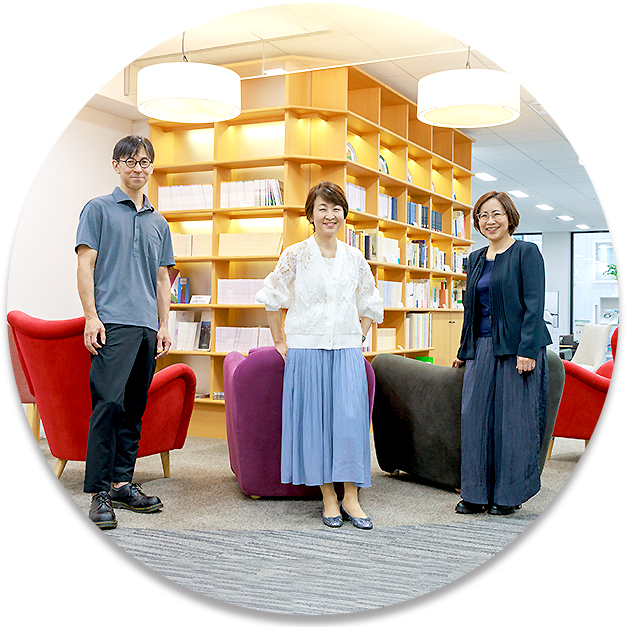
Professor Yukiko Motomura
(Science Journalist, Doshisha University Special Visiting Professor)
Motomura graduated from Kyushu University School of Education. As a reporter for the Mainichi Shinbun, she reported on space development, the Great East Japan Earthquake, and Fukushima Daiichi Nuclear Power Station. In 2006, she received the First Science Award for her journalistic achievements in a series of articles for the White Paper on Science and Technology that she initiated at Mainichi. She was Director of the Science and Environment Department and Vice-Chair of the Editorial Board at the Mainichi before her appointment as Doshisha University Special Guest Professor in Spring 2024. She has also served as a board member at the High Energy Accelerator Research Organization and Kyushu University. She pours her efforts into enhancing scientific literacy through various media such as TV and radio. Books she has authored include Kagaku-ryoku o tsuyokusuru (Strengthening Scientific Literacy)(Iwanami Junior Shinsho), and Kagaku Mesen (Scientific Perspective)(Mainichi Shuppan).
Associate Professor Rekishu Yamazaki
ICU Associate Professor
Yamazaki graduated from Goshen College. He acquired his master's degree and doctorate in 2006 from Purdue University. His academic focus centers around quantum electronics and quantum information. As of 2025, he is in charge of the quantum mechanical memory in the Cabinet Office Moonshot Research and Development Program.
Professor Natsumi Ikoma
ICU CLA Dean
ICU Professor Ikoma acquired her Ph.D. from Durham University in 2002. Prior to her appointment as CLA Dean in April 2022, she served as Director of the Center for Gender Studies and Chair of the Department of Literary Studies. Her research interests include gender, European literature, literature in general, Japanese literature and history of thought.


